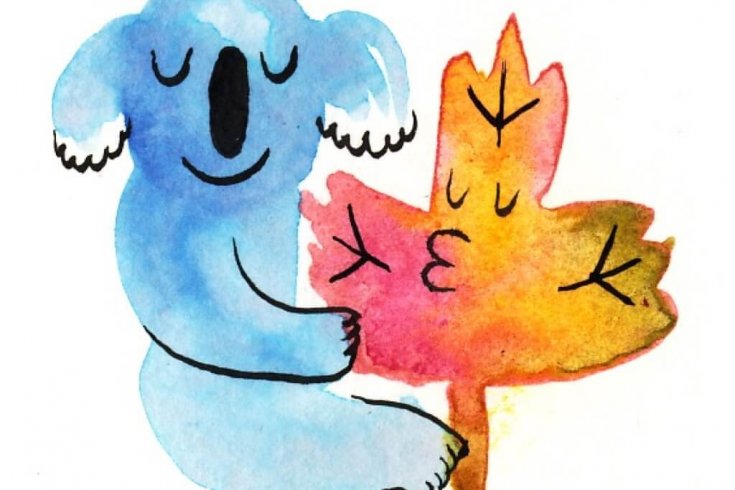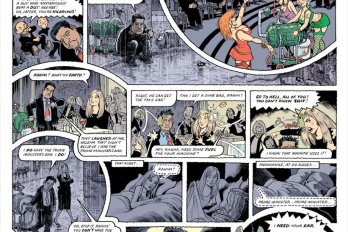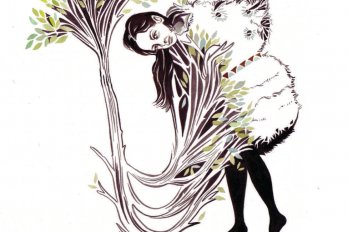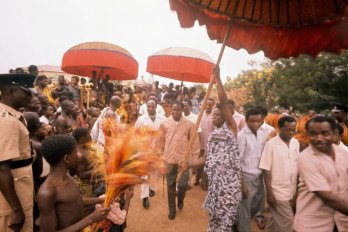The odd fellows hall in Dawson City is the kind of antiquated setting in which you imagine your grandparents’ first meeting taking place: a modest, well-maintained ballroom, perfect for bingo nights and spring mixers. But on this April night, the people in this one-time gold rush hub have gathered here for the eleventh annual Dawson City International Short Film Festival. And settling into their seats with bottles of Yukon Gold, they are hardly old-fashioned and distinctly chummy: I chat up a boat tour operator, who promises me some caribou jerky (which he delivers two days later at Diamond Tooth Gerties, the town’s non-profit casino).
As I weave through rows of stacking chairs, I buy popcorn from a woman with Bettie Page bangs, who glides up to me on roller skates. Her name is Rachel Wiegers, and she is Dawson’s resident burlesque dancer, as well as a cast member of the festival’s most controversial film, Nude Study, shot in town by two Australian filmmakers who were artists-in-residence at the Klondike Institute of Art and Culture. The zaftig thirty-five-year old was cast after being “stereotyped as someone who’s not shy about my body.” The night before, she sat anxiously through her full-frontal screen debut; tonight she’s just helping out with the concessions. Everyone in the room knows her by name. And as an onstage host at last July’s annual Dawson City Music Festival, she’s likely familiar to many of the thousands of Canadians who visit Dawson in the summer, drawn in part by its unlikely status as a subarctic cultural hot spot. In fact, the town’s permanent population is largely made up of one-time visitors, creative misfits who drifted here for the season and simply couldn’t leave.
Down under grads
Ambitious Canucks flock to Australia for professional training

While some folks head north to pursue unconventional career paths, Canadians are increasingly going down under to train for traditional vocations. Australia has become a popular destination for Canadians who want to acquire professional degrees abroad but are short on funds or grade points. According to a recent study by the Canadian Resident Matching Service, more than a quarter of Canadians who studied medicine internationally attended Australian schools. Griffith University, known for its teacher training program, boasts 416 Canadian scholars. And the law school at Bond University has an active student association for Canucks, who comprise roughly 20 percent of its student body. Apparently, the Eucalyptus League has supplanted the Ivy League.
—Jessica Herschman
For an artist, Dawson presents a tantalizing alternative to the shopworn dream of moving to New York: the town’s 1,300 or so residents have come here not to make it, but to pursue their creative projects without critical interference, pocketing enough cash working in local industries to do so in some material comfort (Wiegers, for her part, works in tourism). Home to a visual arts school, the Berton House Writers’ Retreat, and likely more live music venues and art galleries per capita than any place in the country, Dawson is a self-contained arts settlement. It isn’t a place where artists strike gold with their art, but it does encourage experimentation and the headlong pursuit of creative visions, for better or worse.
The film festival, like the music festival, is a product of this ethos. Founded ten years ago, it has welcomed the likes of Don McKellar and Bruce McDonald, but many of the films are made by, and feature, Yukoners. As organizer Dan Sokolowski shouts out the filmmakers in attendance, the room fills with encouraging hoots; given that the crowd is made up mostly of locals, the reception isn’t surprising.
Sokolowski, originally from Kemptville, Ontario, made his first trip to Dawson as a festival participant. “My wife says I stepped off the plane and knew I was home,” he recalls. After several years, he moved here permanently, finding a place in the community teaching workshops for interested locals of all ages and occupations. “Everyone wants to try something different,” he says. “One of the first times I was here, I was talking to a mechanic. The next day, he was watching my experimental animation.”
There’s nothing experimental about Troy Suzuki’s film Dawson City Oldtimers, a series of comical vignettes about the local recreational hockey league, but it is a crowd-pleaser. One skit dramatizes a league member’s real-life account of playing hockey in Norway, where he was paid “$2,000 a month… and all the snatch I could eat.” Another scene features an appearance by Suzuki’s father, the environmentalist David Suzuki, who congratulates the league for successfully harnessing the methane gas emitted by its flatulent players.
When the movies end, the audience empties onto the street. It’s nine in the evening; the Yukon River is still frozen enough to drive across, but the sun shines like a metal bowl. I head into Bombay Peggy’s, a one-time brothel that’s been converted to an inn and saloon. At the bar, Troy Suzuki, who works as a carpenter, tells me about arriving fifteen years earlier from Vancouver, where he studied film. “I came up for a summer, met a woman,” he says. “Same old, same old.” As we make small talk, the teammate featured in his mockumentary tries to convince Dave Bidini, visiting filmmaker and musician, to jam with him at the Pit, the infamous bar where every Dawson night meets its maker.
The following evening, nursing my third consecutive hangover and dreading the inevitable fourth, I head out for another night of movies. Outside the Odd Fellows Hall, I run into Wiegers, who’s curious about my impressions of the place. She arrived here seven years ago from Sackville, Nova Scotia, at the end of a road trip. “In Nova Scotia, there’s a lot more history,” she says. “I still find, back home, that old families run the place; here, anyone can do it.” Since then, she has earned a reputation as an artist and personality, her burlesque shows generating glowing reviews from locals and visiting journalists. “I can be me here. And if you want to do something, people get behind you.”
Wiegers is back at the Odd Fellows Hall on the festival’s third night, this time to perform. Just before a screening of the animated Mak the Horny Mac-Daddy, she enters the room as “The Wild, the Untamed, Chevonne of the Yukon, Toast of Dawson City.” In a shiny backless dress and fishnet stockings, wielding a miner’s pan, she sways her hips down the aisle to Kanye West’s “Gold Digger.” The audience looks on appreciatively, but no one leers. What they see is a local gal, shaping this place and its brief history in her own image.
This appeared in the July/August 2010 issue.





